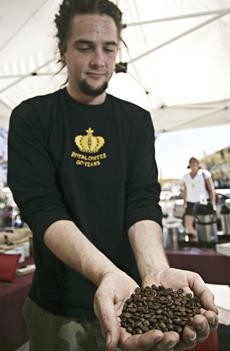French Roast.
Two rounded tablespoons.
Six ounces of water.
Percolate; pour, add two sugars and a dash of milk.
For what most Americans regard as a regular morning routine, the Gilliland family considers an art form – a way of life.
“”About 20 years ago, my father got started in specialty coffee when he was at a bed and breakfast in Quebec,”” said Josh Gilliland.
“”We had a taste of this wonderful, rich, dark brew. It was amazing – like nothing I had ever had. Nobody had even heard of Starbucks on the East Coast,”” said Scott Gilliland. Intrigued, he asked the waiter what made their cup of java so delicious, convinced that there was some unknown barista secret to brewing such an intense, flavorful blend. Instead, the waiter informed Gilliland and his wife that the coffee beans came from a small regional grower in Vermont. They were instantly hooked. They vowed never to return to mass-produced cans of Folgers and soon discovered they could even brew their own coffee right at home.
“”We were the only ones we knew who were grinding our own coffee,”” said Scott.
“”I was in the software industry for about 18 years. Of course, the software industry is fueled on pizza and coffee. I was a real coffee snob during that time. Every office I went into, I changed their ‘coffee drinking culture,’ because you know, office coffee is horrible, wretched stuff,”” said Scott.
The Gillilands sought out the best beans from around the country, and even tried their hand at roasting in their kitchen.
“”He found out you could roast coffee in a hot air popcorn popper,”” said his son, Josh. Mirroring the addictive qualities of the drink itself, coffee became the family’s obsession. Josh recalled when his father first toyed with the idea of turning their passion for coffee into a career.
“”About eight years ago, he said, ‘When my kids are done with school, I’m gonna get a coffee roaster and put it in the back of a pickup truck, and I’m gonna find a farmer’s market on Saturday morning and see if I can sell some coffee beans.'””
And sell they did. What began as a hobby soon developed into a full time business: Adventure Coffee Roasting. The family started selling once a week at a farmer’s market in Rincon Valley, and eventually added five more markets to their account, including the UA Farmer’s Market at Main Gate Square.
They branded their coffee as both fair-trade and organic which, at the time, left customers scratching their heads.
“”About five years ago, if you told somebody you had organic coffee, they’d go ‘Oh! What is that?’ I hear that very little nowadays,”” said Scott.
He said coffee farmers in developing countries are often paid very little for their crops. When companies like Adventure Coffee Roasting opt to sell only fair-trade beans, they help to support the economic well-being of these farmers.
“”They’re starting to grow better and realize the demand for their crops. I think that’s good – it helps them send their kids to school, get medical attention. And that’s why I support fair trade.”” said Scott.
Unfortunately, this usually translates into higher prices for a bag of gourmet beans. Even so, Gilliland notes that very few people are willing to pull the plug on their caffeine addiction.
“”There’s only one other commodity that’s traded on the world markets more than coffee, and that’s oil. I don’t doubt that in ten years, a $20 pound of coffee – or a $30 pound of coffee – will not be uncommon,”” he said.
Adventure Coffee Roasting will typically roast over two and a half tons per month; an enormous amount considering that they only roast beans as frequently as orders come in. This guarantee of a fresh, quality product is what keeps Gilliland’s customers loyal. A typical day at a farmer’s market finds Josh set up in his truck with a golden contraption resembling something out of Willy Wonka & the Chocolate Factory sitting in the back seat. The packaging of the beans is simple; with none of the flashy foil or kitschy cartoon Vespas one might find with mass-produced brands. Gilliland’s coffee doesn’t need to rely on cheap marketing schemes – just a sip of this brew is enough to turn a Starbuck’s fiend into a fair-trade convert.
As a result, most of Adventure Coffee Roasting’s selection consists of beans from four regions of the world: Indonesia, Africa and Central and South America. Unlike mega chains like Starbucks, their inventory frequently changes based on what is currently fresh and available. This can sometimes mean that returning customers won’t be able to purchase a blend they have bought in the past.
“”Starbucks buys hundreds of thousands of pounds of coffee,”” said Gilliland. “”But they can’t get the wonderful little microlots of coffee I’ll get in a very unique coffee.””
The company has recently developed a following in the area, expanding outside of their humble farmer’s market roots. Local Harvest Marketplace will be the future site of Tuscon’s only certified fair-trade espresso bar, serving Gilliland’s drip and espresso blends. Mona’s Danish Bakery, Vintabla, and NewLife Health Food Stores also currently sell Adventure Coffee Roasting products.
Despite their foray into local restaurants, Scott Gilliland said that the family doesn’t anticipate expanding further at this point.
“”We love the business,”” he said. “”It feels like we are doing good, not just making money. And we love that.””









